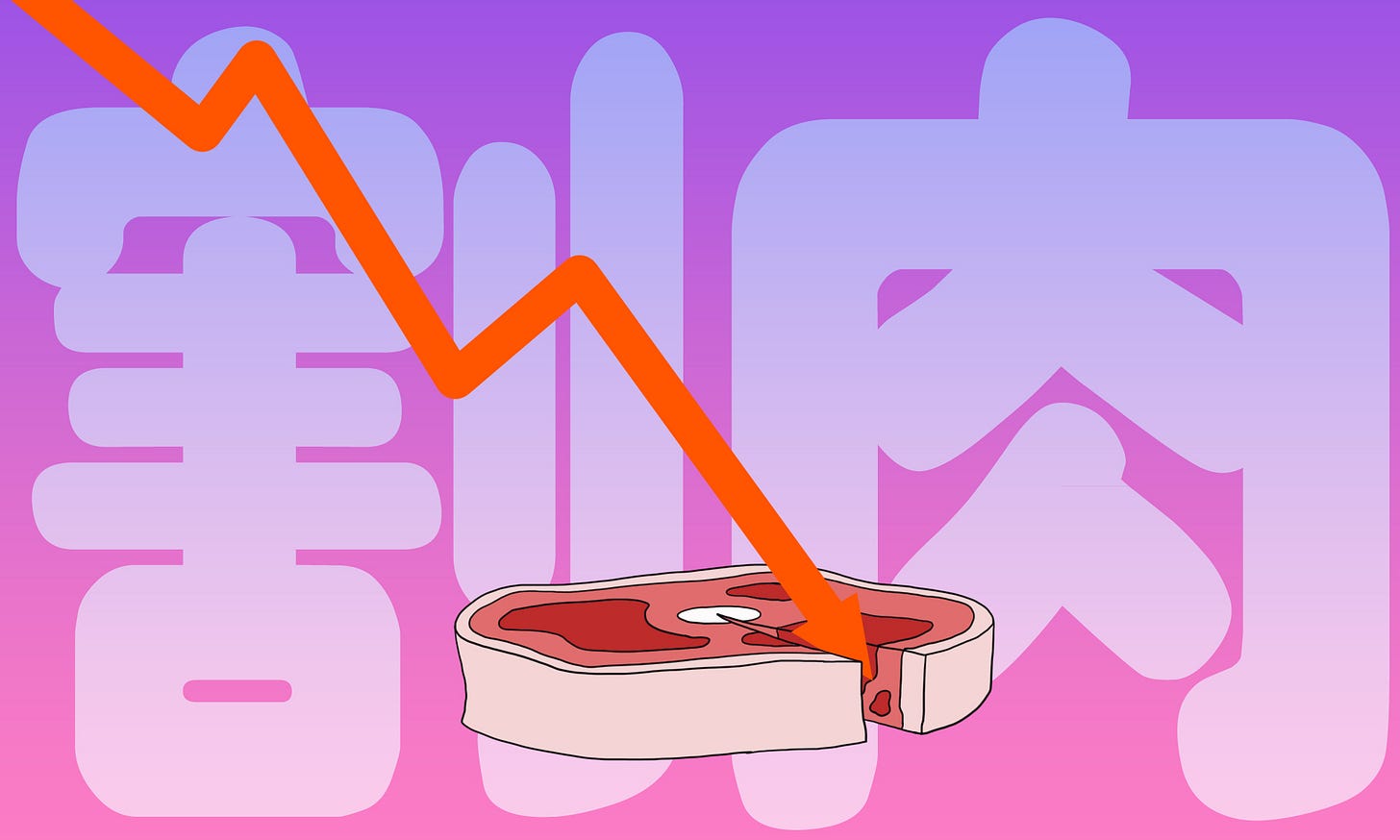Welcome to RealTime Mandarin—a multimedia resource to immerse you in the latest Chinese language trends, inspire you to practice and improve your Mandarin every week, and empower you to communicate with confidence.
Subscribe now to get the next issue straight to your inbox!
Last week the Chinese stock markets went mad.
Shanghai, Shenzhen and Hong Kong Stock Exchanges, and shares of Chinese companies listed in the US, began dropping precipitously on Monday (SupChina).
But stocks in China and Hong Kong rallied on Wednesday following a meeting of the Financial Stability and Development Committee under the State Council (SCMP), chaired by Vice Premier Liú Hè 刘鹤.
Only 15% of investors in China’s stock markets are reportedly investment professionals. The rest are individual investors, 散户 sǎnhù, or 股民 gǔmín, ‘stock people’, confident in their own investment prowess, but with little or no professional investment background. And they are always on the look out for a get-rich-quick deal when markets tumble, by bottom fishing, known as chāodǐ 抄底 - buying up shares when they are at their lowest price.
A small number of influential star investors are like gods in China. One of them is Duàn Yǒngpíng 段永平. He has made billions from his investments and on the stock markets. Now living in the US, he is known as China’s ‘Warren Buffet’.
At times of market instability, Duan’s fans look to him for inspiration:
作为段永平的拥趸,资深股民冯峰在此次3月中旬中概股的连续重挫中,也追随段永平出手抄底了腾讯控股。在他看来,段永平在投资界,有着点石成金的本领,抄他的作业大概率不会差
As a fan of Duan Yongping, seasoned investor Feng Feng, followed Duan’s move and bought Tencent as its share price bottomed out. As far as he is concerned, Duan Yongping has the midas touch in the investment world. If you copy his homework you can’t go far wrong.
But for every Duàn Yǒngpíng, there are thousands of individual investors who have gambled and lost everything. One article well worth a read this week is interviews with a number of investors who embarked on a week-long ‘bottom fishing’ binge that went horribly wrong (36Kr).
有的人饱尝了中概股大跌的惨痛,却在反弹的前一天割肉清仓;也有的人股票已跌破6成,早已佛系看待;有的人瞒着老公炒基金,却赔光了私房钱;还有的人选择进场抄底中概股,反而惨遭中概股“抄家”;有人甚至给父母在老家盖房子的钱都赔进了股市
Some people experienced the full pain of the slump in China stocks, but they cut their losses the day before the rebound; some people's stocks have fallen below 60% of their value, and they have long given up caring; some investors have gone behind their husband’s back to invest in funds and lost all their personal savings; others chose to enter the market to buy Chinese stocks at the bottom, but they ended up losing everything; some people even lost the money they had been saving to build their parents a retirement home.
So this week we read into stories of winning, but mostly losing, during China’s stock market madness.
Favourite Five
1. 割肉 gē ròu
cut meat, cut your losses after losing a lot of money
崩盘和恐慌,割肉和套牢,痛苦和麻木……各种动作和各种情绪在市场里涌动 - Crashes and panics, big losses and getting caught out, pain and numbness…. The market has been flooded with all kinds of emotion.
Related: 套牢 tào láo - get stuck or caught out (first discussed in 27 November, 2021, newsletter)
2. 肉疼 ròu téng
‘painful flesh’, painful
股市坐上过山车,“肉疼”的不止有业内人士,还有千万股民 - The stock markets have been on a roller-coaster ride. It’s not only institutional players that have felt the pain, tens of thousands of individual investors do too.
Note: 肉疼 ròu téng is originally a dialect word which has crossed over into the mainstream
3. 手痒 shǒu yǎng
itchy fingers, tempted to give it a go
听到同事讨论抄底话题时,我没忍住手痒,也想要参与其中了 - When I heard my colleagues talking about bottom fishing, buying in when share prices hit the bottom, I couldn’t resist and decided also to get stuck in.
4. 卷土重来 juǎntǔ chónglái
comeback, bounce back after a failure
近期,国内疫情卷土重来令人担忧 - Recently the pandemic has hit China again, hard, which has caused lots of concern.
Note: originates from a line in the Tang Dynasty poem, Inscription at Wujiang Pavilion (题乌江亭 tí wūjiāng tíng), by Dù Mù 杜牧. One of Dù’s most famous poems is Qing Ming Festival (清明 Qīngmíng) - see short recital on Youtube.
5. 谈笑间,樯橹灰飞烟灭 tán xiào jiān, qiáng lǔ huī fēi yān miè
As they talked and laughed, warships exploded into smoke and dust; the whole world fell apart as they blissfully stood by
本以为基金会是“避风港”的选择,结果让我见识到了什么叫“谈笑间,樯橹灰飞烟灭。” - Originally we thought that investing into a fund would protect against risk. But it actually gave us a glimpse on what ‘the world falling down around our ears’ actually means.
Note: a line from the poem, Remembering Your Charm - Remembrance of the Tale of the Crimson Cliff (念奴娇·赤壁怀古 niàn nú jiāo · chìbì huáigǔ), by Song dynasty poet, Sū Shì 苏轼. (Full poem and Baidu explainer here).
Consuming the Conversation
Basics
中概股 zhōng gài gǔ - ‘China concept stocks’, Chinese companies listed on foreign stoick exchanges
利空 lì kōng - bearish market (opposite is 利好 lì hǎo)
收盘 shōu pán - market close
持仓 chí cāng - position
Useful words
抄底 chāodǐ - bottom fishing, buying in when share prices hit the bottom
还有的人选择进场抄底中概股,反而惨遭中概股“抄家” - Some people chose to enter the market to buy Chinese stocks at the bottom, but they ended up losing everything.
飘绿 piāolǜ - ‘floating green’, fall in share price
近4200只个股收盘飘绿,上涨个股仅400余只 - Almost 4,200 stocks had fallen by the time the market closed. There were just over 400 stocks that had gone up.
Related: 被绿 bèi lǜ - gone green, fallen in price; a more common meaning is ‘to be cheated on by your lover/partner’, which is short for 被人带了绿帽子 - ‘put on a green hat’. It’s now crossed over into market speak, meaning ‘fallen in share price’.
Note: on the Chinese stock markets, red means the price is going up, green represents a fall in price.
筑底 zhù dǐ - ‘build the bottom’, the entire period the share price stays at the bottom
随着政策基本面的改善,或走出筑底反弹的行情 - With the improvement of basic market policies, there is a possibility of moving out of the market lows.
Related: 见底 jiàn dǐ - hit the bottom
浮亏 fú kuī - floating loss, unrealised loss or loss on paper
中概股大跌下,段永平买入的股票不免出现了浮亏 - As China shares fell, shared bought by Duan Yongping also made a loss on paper.
踩雷 cǎi léi - step on a landmine, make a critical mistake
踩过这些雷后,段永平悟出一些道理,即“不做空,不借钱” - Having made these mistakes, Duan Yongping concluded that there were some things he should not do: don’t short-sell, don’t lend money.
佛系 fó xì - Buddhist mindset, watch calmly taking no action
有的人股票已跌破6成,早已佛系看待 - Some shares had already fallen to below 60% of its value, by which time all you can do is watch calmly.
摆烂 bǎi làn - things could not get any worse
我现在对待我的账户完全是“摆烂”式佛系——不管不顾、不闻不问 - I now look at my account as if I totally couldn’t care that it could get any worse. I don’t go near it.















